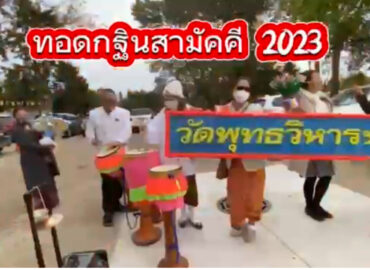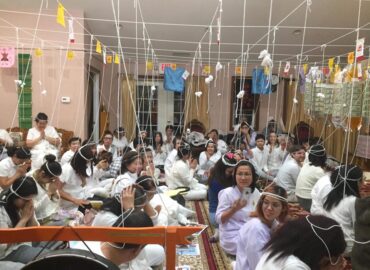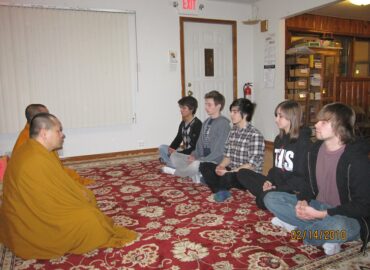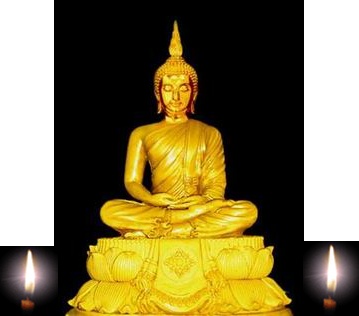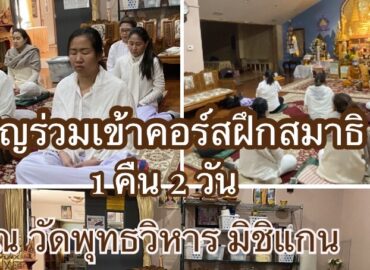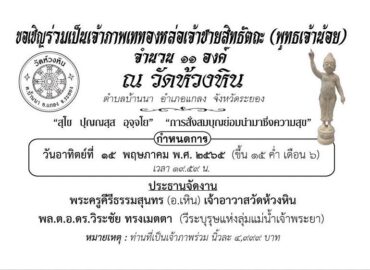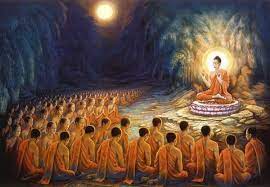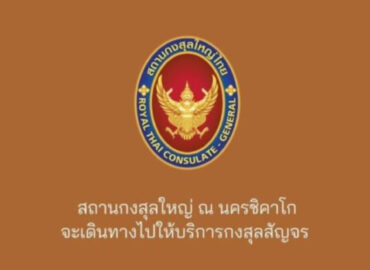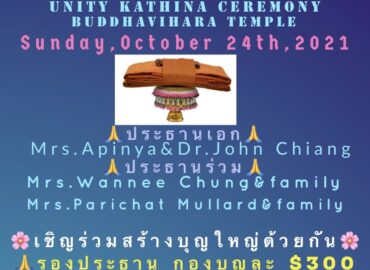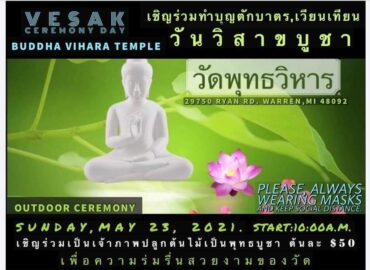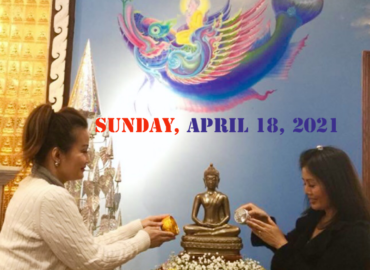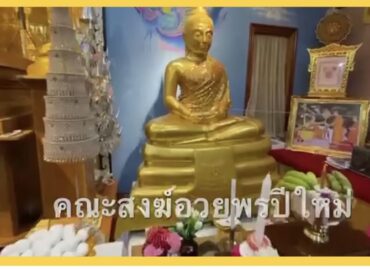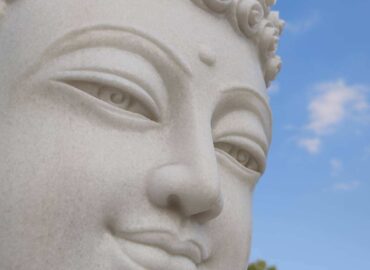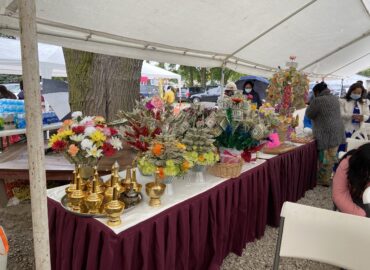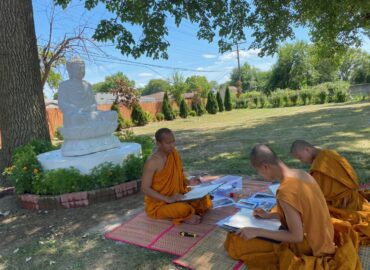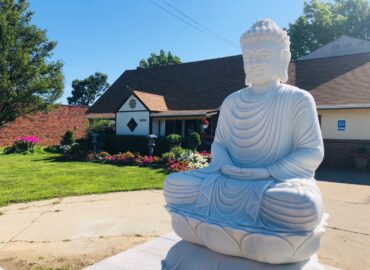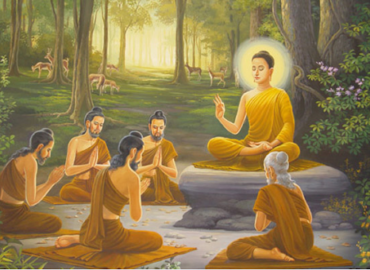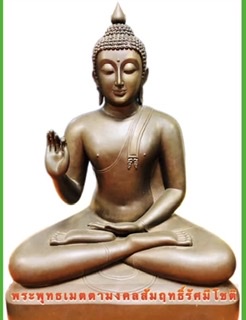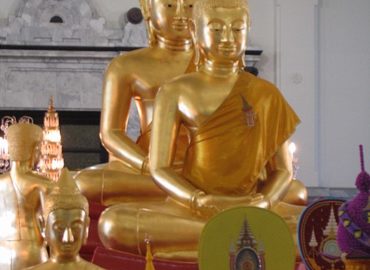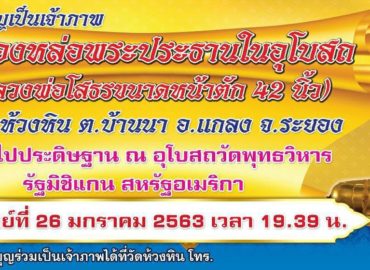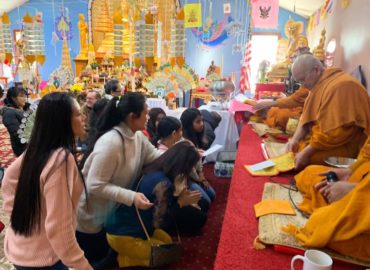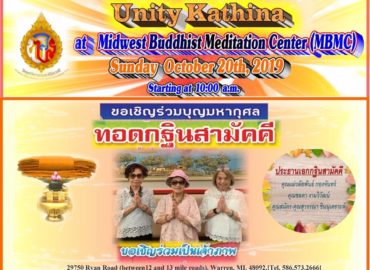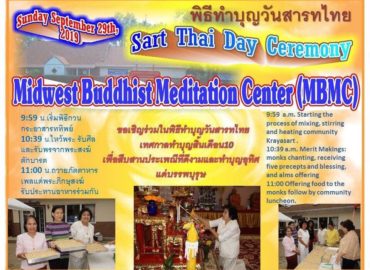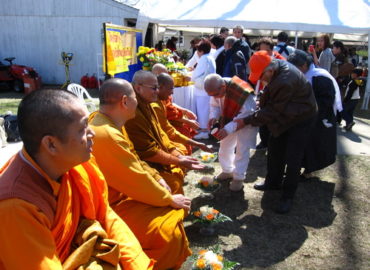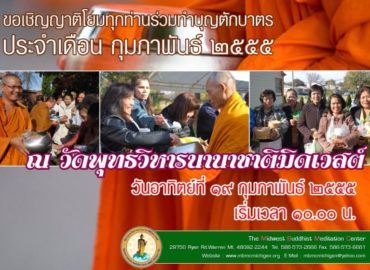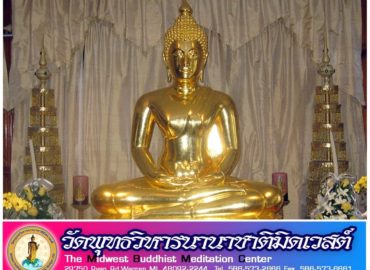From Sigãlovãda Sutta
The Buddha Advised to Sigãlaka a Young Householder
Edited and composed by Venerable Dr. Chuen Phangcham
The Abbot
The Midwest Buddhist Meditation Center
29750 Ryan Rd., Warren, MI 48092
Phone #:586-573-2666; Fax #: 586-573-6661
E-Mail: mbmcmichigan@yahoo.com, Website: http://www.mbmcmichigan.org/
Introduction
In the Western society, especially in the United States of America, there is not much learning about domestic and social relationship as we do in the Eastern countries. Our brothers and sisters, who fled from their home countries and settled down in the West, learned a new culture for their ways of life. Some forget their own culture and adopted a new one in their daily life. Many of them are facing family problems.
The young ones could not understand their own languages and traditions. They are not following the ways their parents do. They, therefore, created family and criminal problems in all parts of the country. I do experience when I go to different states as interpreter in the courts for this community. I was thinking about this problem for many years when I came to Chicago, Illinois and served there. How can I do some things to help in solving this problem for the Asian and south East Asian people living in the North America today.
Ancient Domestic and social relationship from Buddhist practice may be the best idea to be adopted in this society to help in solving this problem. However, this teaching is old but practical and beneficial for all people for families and social sustention.
Originally this booklet was prepared for interfaith talk and dialogue for June 18-19, 2005, in Farmington Hills, Michigan. Also I find it is good to prepare to distribute in Wat Thai Washington, D.C. to honor Venerable Phra Videsdhammarangsi, (Surasak Jivanado, Thammarat), on his Eighty years anniversary, June (9)12, 2005.
We thank Ven. Oros Nareekham, MBMC Sangha, and our friends who have done all aspects of this first edition. We find that Domestic and social relationship of Buddhist Teachings may be applied for the need of Western technological society. We, therefore, choose this topic from Sutta Pitaka Diganikaya for this purpose.
Hopefully this book may prove to be beneficial and useful for not only Asian families living in the North America, but also for those our local friends as well. I personally hope that this presentation will help our parents to take care of their children and lead them in the proper direction. The young people can learn about our ancient Buddhist practice. Finally our young generation may find updating of Buddhist practice for their own benefits to sustain our society. Peace and happy family life would be expected.
May peaceful family life, and happiness be developed in our society. May peace prevail on earth.
C. Phangcham, Ph.D.
MBMC, Michigan
5-28-05

Domestic and Social Relations
Sigãlovãda Sutta
The Buddha Advised to Sigãlaka, A Young Householder
Diga-Nigãya-31
This booklet has been printed for free distribution in honor of Venerable Phra Videsdhammarangsi, Surasak Thammarat, the Abbot of Wat Thai Washington, DC, on his eightieth Birth-day. The Midwest Buddhist Meditation Center, MBMC, known as Buddha Vihara, Warren, Michigan, finds that this Sutta, discourse, is good, suitable and applicable for the western society at this time. The readers may find how what the Buddha taught is practicable for all people from all walks of life regardless of age, sex, color and nationality.
Story: Once the Buddha was staying at Veluvanãrãm, a Bamboo Grove, the first Buddhist Monastery in the world. One day in the early morning while he was walking for his alms in the street suburban of Rãjagaha city, northeastern of India today. He met a young man named Sigãla, (Sigãlaka) who was with wet clothes and wet hairs, performing a rite of / worship, his clasped hands uplifted to the different directions of earth and sky, to east, west, north, south, to the nadir and the zenith. The Buddha greets him, and asked him why he’s doing this Pujã. The young man replied, he is doing this Pujã /ceremony to get blessing from the gods sitting in the six directions.
The Buddha asked him, Why is it so? And how is that? The young man replied, my father, while he was on his death-bed, told me before he died that if I do this ceremony, I will get blessing from the gods sitting in six directions. I am, therefore, doing this in honoring, reverencing, revering my father’s words, and holding it’s sacred, that is why I am doing this worship this is what we believe in our Brahmin practice.
The Buddha said that you are good son and grateful son that you honor your father’s words. Okay good, Sigãla, you are good. But in discipline of Ariya, Noble Ones, Sigãla, the six directions should not be worshipped in this way. Well Lord, how should one pay homage to the six directions according to the Ariyan disciples? Asked Sigãla. It would be good if the Blessed One were to teach me the proper ways to pay homage to the six directions according to Ariyan disciples.
The Buddha’s Advices: Hear, young householder, said the Buddha, reflect carefully, I will tell you. Yes Sir, replied young Sigãla. Just as a young householder, an Ãriyan disciple put a way the four vices in conduct, just as he does no evil actions from the four evil causes; just as he does not make toward the six doors of dissipating wealth; avoiding these fourteen evil things, he is a guardian of the six directions, by this practice he becomes conqueror of both worlds, he is successful both in this existence and the next. At the dissolution of the body, after death, he is reborn to a happy destination in heavenly world. What are the four vices of conduct that he has avoided?
Taking life is one, taking what is not given is one, sexual misconduct is one, lying speech is one. These are the four vices of conducts that he abandons. Thus the Buddha said, and added:
Taking life and stealing, lying, adultery, the wise reprove.
What are the four causes of evil from which he (she) refrains?
Evil actions are done from the causes of ill-will, from folly/enmity, stupidity, and fear. But as the Ãriyan (noble people) disciple led away by these motives he does no evil actions through them.The Buddha further spoken and added:
Desire and hatred, fear and folly:
He who speak the law through these,
Loses all his fair repute
Like the moon at waning time.
Selfish desire and hatred, fear and folly,
He who never yields to these
Grows in goodness and repute
Like the moon at waxing time.
And by which are the six doors of dissipating wealth?
Drink; frequenting the streets at unseemly hours;
Addicted to the fairs; gambling; associating with evil friends; idleness.
There are these, young householder, six dangers of drink. The actual lose of wealth; increase of quarrellings; susceptibility to disease, lose of good name; indecent exposure of one person; ruining one’s intelligence.
Six, young householder, are the perils a man runs through frequenting the streets at unseemly hours; he himself is unguarded or unprotected and also too are his wife and his children; so also is his property; in addition he falls under the suspicion of being responsible for undetected crimes; false rumours are attached to his name; he encounters all sources of troubles.
There are six perils in haunting fairs; a man keeps looking about to see where is there dancing. Where is there singing? Where is there music? Where is there recitation? Where is there cymbal playing? Where is there the beating of tam-tams?
Six, young householder, are the perils of gambling; if the man wins, he is hatred; if the man loses, he mourn his lost wealth; waste of wealth; his words has no weight in an assembly (a court of law); he is despised by his friends and companions; he is not sought in marriage, for people will say that a man who is a gambler will never make a good husband.
There are six perils of associating with evil friends; any gambler, any libertine, any tippler, any cheat, any swindler, any man of violence becomes his friends and companion.
There are six perils of idleness; a man says, it is too cold, and does not work. He says, it is too hot, and does not work. He says, it is too early, and does not work. He says it is too late, and does not work. He says, I am too hungry, and does not work. He says, I am too full, and does not work.
And the Well-farer having spoken, the Buddha added:
Some are drinking mates, and some,
Profess their friendship to your face,
But those who are your friends in need,
They are friends indeed.
Sleeping late, adultery,
Picking quarrels, doing harm,
Evil friends and stinginess,
These six things destroy a man.
He who goes with wicked friends
And spends his time in wicked deeds,
In this world and the next as well
That man will come to suffer woe.
Dicing, wenching, drinking too,
Dancing, singing, daylight sleep,
Untimely prowling, evil friends
And stinginess destroy a man.
He plays with dice and drinking strong drink.
And goes with other’s well-loved wives.
He takes the lower, baser course,
And fades away like waning moon.
The drunkard, broke and destitute,
Even thirsting as he drinks,
Like stone in water sinks in debt,
Soon bereft of all his kin.
He who spends his days in sleep,
And makes the night his waking-time,
Even drunk and lecherous,
Can not keep a decent home.
“It is too cold! It is too hot! It is too late” they cry,
Thus pushing all their work aside,
Till every chance they might have had
Of doing good has slipped away.
But he who reckons cold and heat
As less than straws, and like a man
Undertakes the task in hand,
His joy will never grow the less.
And while all that he should do remain undone, he makes no money and such wealth as he has dwindled away.
Four persons should be reckoned as foes in the likeness of friends: the rapacious person; a man who pays lip-service only to a friend; the flatterer; the wastrel.
Of these the first is to be reckoned as a foe in the likeness of a friend on four grounds: he is rapacious; he gives a little and expects much; he does what he has to do out of fear; he pursues his own interests.
On four grounds the man who pays lip-services only to a friend is to be reckoned as a foe in the likeness of a friend:
He makes friendly professions as regards the past;
He makes friendly professions as regards the future;
The only service he renders is by his empty saying;
When the opportunity for service arises he shows his unreliability.
On four grounds the flatterer is to be reckoned as a foe in the likeness of a friend:
He approves your bad deeds, as well as your good deeds;
He praises you to your face, and in your absence he speaks ill of you.
Of four grounds the wastrel is to be reckoned as a foe in the likeness of a friend:
He is your companion when you go drinking;
When you frequently the streets at untimely hours;
When you haunt shows and fairs;
When you are gambling.
Thus the Buddha spoke. The Blessed One added:
The friend who seeks what he can get,
The friend who talks but empty words,
The friend who merely flatters you,
The friend who is a fellow-wastrel;
These four are really foes, not friends.
The wise man, recognizing this,
Should hold himself aloof from them
As from some path of panic fear.
The friends who should reckoned as a good-hearted (friends) are four:
The helper; the friend who is constant in happiness and adversity;
The friend of good counsel;
The sympathetic friend.
The friend who is a helper is to be reckoned as good-hearted on four grounds:
He protects you when you were taken unawares;
He protects your property when you are not there to protect it;
He is refuge to you when you are afraid;
When you have tasks to perform he provides twice as much help as you may need.
The friend who is constant in happiness and adversity is to be reckoned as good heart on four grounds:
He tells you his secrets;
He does not betray your secrets;
In your troubles he does not forsake you;
For your sake he will even lay down his life.
The friend of good counsel is to be reckoned as a good heart friend on four grounds:
He restrains you from doing wrong;
He enjoins you (do what is) right;
From him you learn what you had not learnt before;
He shows you the way to heaven (happy life).
The friend who is sympathetic is to be reckoned as good-hearted in four grounds:
He does not rejoice over your misfortunes;
He rejoices with you in your prosperity;
He retrains those who speak ill of you;
He commends those who speak well of you.
And how, young householder, does the Ãriyan (noble) disciple protect the six quarters? (to worship gods sitting in the six directions)
The following should be looked upon as the (gods sitting in the) six directions:
Parents as the east;
Teachers as the south;
Wife as the west;
Friends and companions as the north;
Servants and employees as the nadir;
Recluses and Brahmins (the religious persons) as the zenith.
Child should minister to his/her parents as the (god sitting in) eastern direction in five ways (saying to himself/herself)
Once I was supported by them, now I will be their support;
I will perform those duties they have to perform;
I will maintain the lineage and tradition of my family;
I will look after my inheritance;
And I will give alms on behalf of them.
Parents thus ministered to by their children as the eastern direction show their love for them in five ways:
They will restrain them from evil, support them doing good;
they train them to a profession;
They arrange suitable marriage for them;
And in duce time, they hand over the inheritance to them.
In this way the (gods sitting in) eastern direction is protected and made safe and secure for them.
A pupil should minister to his/her teachers as the southern direction in five ways:
By rising (from his/her seat, to salute them);
By waiting upon them; by his/her eagerness to learn;
By personal service;
And by respectfully accepting their teaching.
Teachers, thus minister to as the southern direction by their student, show their love for their student in five ways:
They train him/her well;
They make him/her grasp what he/she has learnt;
They instruct him/her thoroughly in the lore of every art;
They introduce him/her to their friends and companions;
They provide for his/her security in all directions.
In this way the (god sitting in) southern direction is protected and made safe and secure for him/her.
They are four ways in which husband should minister to his wife as the western direction:
By respecting her; by his courtesy;
By being faithful to her;
By handing over authority to her;
By providing her with adornment (and so on.)
The wife, ministered to by her husband as the western direction, loves her husband in five ways:
By doing her duty well;
By hospitality to attendants and relatives of her husband;
By her fidelity;
By looking after his earnings;
And by skillful and industry in all her business dealings.
In this way the (god sitting in) western direction is protected and made safe and secure for her.
There are four ways in which a member of family should minister to his/her friends and companions as the northern direction:
By generosity; by courtesy;
By benevolence;
By equality (treat them as he/she treats himself/herself;
And by being truthful to his/her words.
Thus ministered to as the northern direction, his/her friends and companions love him/her in these five ways:
They protect him/her when he/she is in need of protection;
They look after him/her property when he/she is unable to;
They become refuge in danger;
They do not forsake him/her in his/her troubles; and they respect even others related to him/her.
In this way the northern direction is protected and made safe and secure for him/her.
A master ministers to his/her servants (or colleagues) and employees as the nadir in five ways:
Assigning them work according to their capability and strength;
By supplying them with food and wages;
By tending them in sickness;
By sharing with them unusual delicacies;
And by giving them leave and gifts at suitable times.
In this ways ministered to by their master, servants (or colleagues) and employees love their master in five ways:
They wake up before their master;
They go to bed after their master;
They take what is given to them;
They do their works well;
And they speak well of their master and give their master a good reputation.
A householder should minister to ascetics and religious persons as the zenith in five ways:
By compassionate acts;
By compassionate words;
By compassionate thoughts;
By keeping open house for them;
By supplying them with their material needs.
In this way ministered to as the zenith in five ways, recluses and religious persons show their love for the householders in six ways:
They keep them from evil deeds;
They exhort them to do good deeds;
They love them with kindly thoughts;
They teach them what they have not learnt;
They correct and refine what they have learnt;
They reveal to them the way to happy life (in this life and life to come).
In this way is the zenith protected and made safe and secure for him/her.(making them to have peace in mind and free from fear)
The Buddha, well farer having spoken and added:
Mother and father are the east,
Teachers are the southern direction,
Wife and children are the western direction,
Friends and colleagues are the northern direction,
Servants and workers are the direction below,
Ascetics and religious persons are the direction above,
These directions should be honored by the householders,
He/she who’s wise and disciplined,
Kindly and intelligent,
Humble, free from pride,
Such one may honor gain,
Early rising scorning sloth,
Unshaken by adversity (worldly conditions),
Of faultless conduct, ready wit,
Such a one may honor gain,
Making friends and keeping them,
Welcoming no stingy host,
A guide philosopher and friend,
Such a one may honor gain,
Giving gifts and kindly speech,
A life well-spent for other’s good,
Even-handed in all things,
Impartial as each case demands:
These things make the world go round,
Like the chariot’s axle-pin.
If such things did not exist,
No mother from her son would get
Any honor and respect,
Nor father either, as their due.
But since these qualities are held
By the wise in high esteem,
They are given prominence
And are rightly praised by all.
After the Blessed One had thus spoken, Sigãla the young householder said this: Excellent, Sir, excellent! It is as if one should set upright what had been turned upside down, or reveal what had been hidden away, or show the way to a man gone astray, or bring a lamp into darkness so that those with eyes might see things there. In this manner the Dhamma is expounded by the Blessed One in many ways. And I take refuge in the Blessed One, in the Dhamma and in the Community of Bhikkhus.
May the Blessed One receive me as his lay-disciple, as one who has taken his refuge in him from this day forth as long as life endures.
Dĩgha Nikãya No31
Paper Presented in Interfaith Dialogue
Buddhism, Jainism, Christianity, Hindu and Jewish,
Farmington Hills, Michigan 6-19-05
5-5-05/919-05



